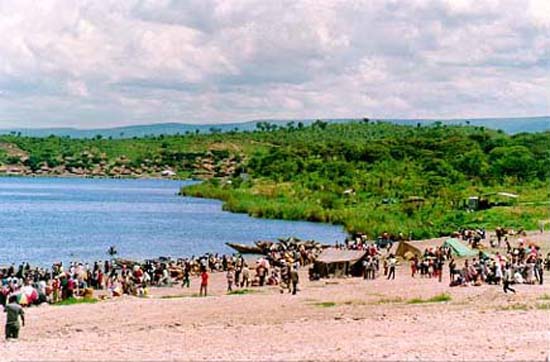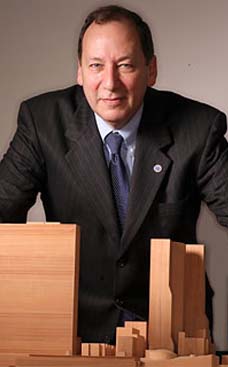
"Our overall Corps mission has always been to work with various village groups to improve lifestyle," he says. "These get together to discuss bee keeping, AIDS problems, tailoring and timber conservation. Nearly every man builds wooden devices, every home has a daily fire, and all forests are open and free. "Nighttime was best time," Chad says. "After a supper of soft, corn mush biscuits which they use to scoop up boiled okra or cabbage, the men and women separate into two groups, the men talking about their peanuts, cotton and, of course, corn. Also imbibing kichasu, a strong grain alcohol, often too much of it. The women tell exploits of their children, and progress of the sick. For excitement, the boys start a soccer game that gets faster and louder as it moves. Basketball gives the girls lots of fun. Their version of the game allows no dribbling, just passing. The court, a cleared field, has two poles holding up wire rings but no nets. Everybody feels free to laugh, tell stories or even dance."
Chad Conaty serves as a Peace Corps Volunteer in Zambia
Peace Corps adventures and pleasures - Corn mush, hard labor, school days and survival in Africa
| Sunday, December 30, 2007
Leave a Comment | Default | Large
It's 6:30 a.m., July 20, 2005 in Chiwanga, Zambia. The chickens are crowing, the babies crying, cows mooing and women talking as they walk past Chad Conaty's hut on their way to the sinkhole for water. To make the task easier, they will balance the plastic buckets on their heads for the half-mile back.
Surrendering to the melee, Chad, a Peace Corps Virginian who claims 20-odd S.C. cousins, sits up on his cot, then reluctantly slips on a T-shirt, khaki shorts and flip flops. Heading out for his own bucket of washing and cooking water, he is one of few men in the line because Zambian guys do cropping and carpentry. The women do everything else.
This hot country in the heart of southern Africa is the same size as Texas. Two-thirds of its 11 million exist in tiny villages out in the bush. From the beginning of his arrival in Chiwanga, after eight weeks of language training in a town nearby, Chad has felt welcome and safe. All the hundred and fifty very curious residents gathered to see the first white man to ever live among them. They had built a new mud and sand block hut with a dried elephant grass roof.
Back with the water, he washes his hands and face in a plastic basin while listening to news over the British Broadcasting System on a battery radio. Trouble is a mouse recently discovered the plastic antenna cord and chewed it apart. With boiling water, he will make his own oatmeal (the people have corn mush) and some coffee with his small supply of sugar. Because they earn almost no spending money, the residents seldom taste such luxuries.
Seven miles to school
The hot season, which runs from August to March, has started, the weather dipping to only 65 during the night. When he comes outside at eight thirty, the temperature has climbed to 90 and will go up another 10 degrees by noon. In the cool months, May through July, it drops, but not much, to 60 to 85.
He has a bicycle, but walks to the school a half-mile away, chatting with the dozens of pupils in his limited Nyanja words. For some the walk is seven miles. The building, crudely laid brick, has a sheet iron roof and is divided into six classrooms where the 500 grammar-level students take their seats at aging desks.
Six teachers give the arithmetic, geography and literature lessons in Nyanja, with only Chad speaking English as he begins the daily English alphabet practice. Over and over, the children recite the ABCs, their mouths struggling to make unfamiliar sounds. Many of their words are of non-English sounds formed under the tongue. Fortunately, Chad has an assistant to help both him and the children communicate.
When the grammar grades let out at noon, 300 high school students take their places, and Chad upgrades his lessons to sentence structure.
In late afternoon, back in the village, he will have continuous visitors, from villagers who seek advice, or just want to vent their curiosity through conversation. He counsels them on preventing malaria and diarrhea, both prevalent scourges. Also on sanitation, explaining the importance of washing in clean water rather than some another member of the family has used.
"Funny thing," he says, "None have toothbrushes, but all have white, strong teeth. Keep in mind that stores selling candy bars, cookies, cakes or bottle drinks are leagues away."
Mush biscuits and okra
"Our overall Corps mission has always been to work with various village groups to improve lifestyle," he says. "These get together to discuss bee keeping, AIDS problems, tailoring and timber conservation. Nearly every man builds wooden devices, every home has a daily fire, and all forests are open and free.
"For local government, a chief, Chiewa, oversees many villages, settling disputes, making decisions and delegating responsibilities. His word is final. All the national government provides are health clinics and schools.
"Nighttime was best time," Chad says. "After a supper of soft, corn mush biscuits which they use to scoop up boiled okra or cabbage, the men and women separate into two groups, the men talking about their peanuts, cotton and, of course, corn. Also imbibing kichasu, a strong grain alcohol, often too much of it. The women tell exploits of their children, and progress of the sick. For excitement, the boys start a soccer game that gets faster and louder as it moves. Basketball gives the girls lots of fun. Their version of the game allows no dribbling, just passing. The court, a cleared field, has two poles holding up wire rings but no nets. Everybody feels free to laugh, tell stories or even dance."
Every two weeks, Chad bicycled ten miles into Katete for a couple days R and R with other Peace Corps workers. He collected his mail, which often included goodies from home. An extra bonus was the acquaintanceship with Elizabeth "Liz" Watkins from Stoke-on-Trent, England, where her father is a vicar for the Church of England. Stoke is also the home of world-famous Wedgewood, Spode and Royal Dolton china.
Chad shared a sad farewell with many village friends when his assignment ended in August, returning to his home near Washington. Liz came to visit in December and was introduced not only to the national capital, but Charleston, a sort-of American capital, and many of Chad's cousins. He hopes to begin studies toward a master's degree in international development next October in England. After that, both he and Liz would like to work in some humanitarian field in Africa. Good luck.
Retired editor and public relations executive Thomas Langford's column is titled "Some Edisto stories." Let him know if you have stories to share: 803-534-2097.













